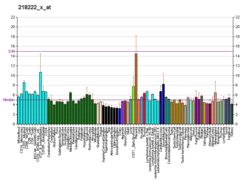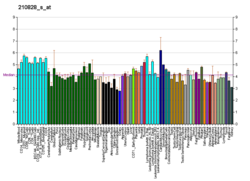芳香族炭化水素受容体核内輸送体
表示
芳香族炭化水素受容体核内輸送体(ARNT: aryl hydrocarbon receptor nuclear translocator)は、リガンド結合型芳香族炭化水素受容体(AhR)と複合体を形成するタンパク質であり、AhRが受容体として機能するために必要である。また、低酸素誘導因子1(HIF1)のベータサブユニットとしても知られている。TEL-ARNT融合タンパク質の発現をもたらす遺伝子座のt(1; 12)(q21; p13)転座は、急性骨髄芽球性白血病と関連している。この遺伝子について、異なるアイソフォームをコードする3つのスプライスバリアントが報告されている。
AhRは、生体異物代謝に関与するいくつかの酵素の誘導に関与している。リガンドを含まない、細胞質ゾル型のAhRは、熱ショックタンパク質90(Hsp90)と複合体を形成する。ダイオキシンと多環芳香族炭化水素を含むリガンドの結合は、リガンド結合サブユニットの核への転座をもたらす[5]。生体異物代謝に関与する酵素の誘導は、これら酵素の遺伝子のプロモーター内の生体異物応答エレメントへのリガンド結合型AhRの結合を介して発生する。
相互作用分子
[編集]ARNTは、以下の生体分子と相互作用する。
脚注
[編集]- ^ a b c GRCh38: Ensembl release 89: ENSG00000143437 - Ensembl, May 2017
- ^ a b c GRCm38: Ensembl release 89: ENSMUSG00000015522 - Ensembl, May 2017
- ^ Human PubMed Reference:
- ^ Mouse PubMed Reference:
- ^ Duncan Hughes, Joseph B. Guttenplan, Craig B. Marcus, Kotha Subbaramaiah and Andrew J. Dannenberg (5 November 2008). “Heat Shock Protein 90 Inhibitors Suppress Aryl Hydrocarbon Receptor-Mediated Activation of CYP1A1 and CYP1B1 Transcription and DNA Adduct Formation”. Cancer Prevention Research 1 (6): 485–493. doi:10.1158/1940-6207.CAPR-08-0149. PMC 2680610. PMID 19138996.
- ^ Lucy A. Carver, Christopher A. Bradfield (25 April 1997). “Ligand-dependent interaction of the aryl hydrocarbon receptor with a novel immunophilin homolog in vivo”. Journal of Biological Chemistry 272 (17): 11452–6. doi:10.1074/jbc.272.17.11452. PMID 9111057.
- ^ Arunas Kazlauskas, Sara Sundström, Lorenz Poellinger, and Ingemar Pongratz (April 2001). “The hsp90 chaperone complex regulates intracellular localization of the dioxin receptor”. Molecular and Cellular Biology 21 (7): 2594–607. doi:10.1128/MCB.21.7.2594-2607.2001. PMC 86890. PMID 11259606.
- ^ M.C. Lindebro, L. Poellinger, M.L. Whitelaw (01 July 1995). “Protein-protein interaction via PAS domains: role of the PAS domain in positive and negative regulation of the bHLH/PAS dioxin receptor-Arnt transcription factor complex”. EMBO Journal 14 (14): 3528–39. doi:10.1002/j.1460-2075.1995.tb07359.x. PMC 394421. PMID 7628454.
- ^ M Whitelaw, I Pongratz, A Wilhelmsson, J A Gustafsson, L Poellinger (April 1993). “Ligand-dependent recruitment of the Arnt coregulator determines DNA recognition by the dioxin receptor”. Molecular and Cellular Biology 13 (4): 2504–14. doi:10.1128/MCB.13.4.2504. PMC 359572. PMID 8384309.
- ^ Yumi Yamaguchi, M. Tien Kuo (12 October 1995). “Functional analysis of aryl hydrocarbon receptor nuclear translocator interactions with aryl hydrocarbon receptor in the yeast two-hybrid system”. Biochemical Pharmacology 50 (8): 1295–302. doi:10.1016/0006-2952(95)02016-6. PMID 7488247.
- ^ Junsei Mimura, Masatsugu Ema, Kazuhiro Sogawa, and Yoshiaki Fujii-Kuriyama (01 January 1999). “Identification of a novel mechanism of regulation of Ah (dioxin) receptor function”. Genes & Development 13 (1): 20–5. doi:10.1101/gad.13.1.20. PMC 316371. PMID 9887096.
- ^ a b John B. Hogenesch, William K. Chan, Victoria H. Jackiw, R. Clark Brown, Yi-Zhong Gu, Marilyn Pray-Grant, Gary H. Perdew, Christopher A. Bradfield (28 March 1997). “Characterization of a subset of the basic-helix-loop-helix-PAS superfamily that interacts with components of the dioxin signaling pathway”. Journal of Biological Chemistry 272 (13): 8581–93. doi:10.1074/jbc.272.13.8581. PMID 9079689.
- ^ a b c Susan L. Woods, Murray L. Whitelaw (22 March 2002). “Differential activities of murine single minded 1 (SIM1) and SIM2 on a hypoxic response element. Cross-talk between basic helix-loop-helix/per-Arnt-Sim homology transcription factors”. Journal of Biological Chemistry 277 (12): 10236–43. doi:10.1074/jbc.M110752200. PMID 11782478.
- ^ Timothy V Beischlag, Song Wang, David W Rose, Joseph Torchia, Suzanne Reisz-Porszasz, Khurshid Muhammad, Walter E Nelson, Markus R Probst, Michael G Rosenfeld, Oliver Hankinson (15 June 2002). “Recruitment of the NCoA/SRC-1/p160 family of transcriptional coactivators by the aryl hydrocarbon receptor/aryl hydrocarbon receptor nuclear translocator complex”. Molecular and Cellular Biology 22 (12): 4319–33. doi:10.1128/mcb.22.12.4319-4333.2002. PMC 133867. PMID 12024042.
- ^ a b Markus R. Probst, Chen-Ming Fan, Marc Tessier-Lavigne, Oliver Hankinson (14 February 1997). “Two murine homologs of the Drosophila single-minded protein that interact with the mouse aryl hydrocarbon receptor nuclear translocator protein”. Journal of Biological Chemistry 272 (7): 4451–7. doi:10.1074/jbc.272.7.4451. PMID 9020169.
- ^ Norihisa Ooe, Koichi Saito, Nobuyoshi Mikami, Iwao Nakatuka, Hideo Kaneko (15 January 2004). “Identification of a novel basic helix-loop-helix-PAS factor, NXF, reveals a Sim2 competitive, positive regulatory role in dendritic-cytoskeleton modulator drebrin gene expression”. Molecular and Cellular Biology 24 (2): 608–16. doi:10.1128/mcb.24.2.608-616.2004. PMC 343817. PMID 14701734.
- ^ P Moffett, M Reece, J Pelletier (September 1997). “The murine Sim-2 gene product inhibits transcription by active repression and functional interference”. Molecular and Cellular Biology 17 (9): 4933–47. doi:10.1128/mcb.17.9.4933. PMC 232345. PMID 9271372.
参考文献
[編集]- Volker H. Haase (01 August 2006). “Hypoxia-inducible factors in the kidney”. American Journal of Physiology-Renal Physiology 291 (2): F271–81. doi:10.1152/ajprenal.00071.2006. PMC 4232221. PMID 16554418.
- Herminio Reyes, Suzanne Reisz-Porszasz and Oliver Hankinson (22 May 1992). “Identification of the Ah receptor nuclear translocator protein (Arnt) as a component of the DNA binding form of the Ah receptor.”. Science 256 (5060): 1193–5. Bibcode: 1992Sci...256.1193R. doi:10.1126/science.256.5060.1193. PMID 1317062.
- E C Hoffman, H Reyes, F F Chu, F Sander, L H Conley, B A Brooks, O Hankinson (17 May 1991). “Cloning of a factor required for activity of the Ah (dioxin) receptor.”. Science 252 (5008): 954–8. Bibcode: 1991Sci...252..954H. doi:10.1126/science.1852076. PMID 1852076.
- Yumi Yamaguchi, M. TienKuo (12 October 1995). “Functional analysis of aryl hydrocarbon receptor nuclear translocator interactions with aryl hydrocarbon receptor in the yeast two-hybrid system.”. Biochemical Pharmacology 50 (8): 1295–302. doi:10.1016/0006-2952(95)02016-6. PMID 7488247.
- G L Wang, B H Jiang, E A Rue, and G L Semenza (6 June 1995). “Hypoxia-inducible factor 1 is a basic-helix-loop-helix-PAS heterodimer regulated by cellular O2 tension.”. PNAS 92 (12): 5510–4. Bibcode: 1995PNAS...92.5510W. doi:10.1073/pnas.92.12.5510. PMC 41725. PMID 7539918.
- M. C. Lindebro, L. Poellinger, M. L. Whitelaw (17 July 1995). “Protein-protein interaction via PAS domains: role of the PAS domain in positive and negative regulation of the bHLH/PAS dioxin receptor-Arnt transcription factor complex.”. EMBO Journal 14 (14): 3528–39. doi:10.1002/j.1460-2075.1995.tb07359.x. PMC 394421. PMID 7628454.
- B. D. Abbott, M. R. Probst, G. H. Perdew (November 1994). “Immunohistochemical double-staining for Ah receptor and ARNT in human embryonic palatal shelves.”. Teratology 50 (5): 361–6. doi:10.1002/tera.1420500507. PMID 7716743.
- Suzanne Porszasz-Reisz, Markus Probst, B.N. Fukunaga, Oliver Hankinson (1994). “Identification of functional domains of the aryl hydrocarbon receptor nuclear translocator protein (ARNT).”. Molecular and Cellular Biology 14 (9): 6075–86. doi:10.1128/mcb.14.9.6075. PMC 359134. PMID 8065341.
- Kazuo Maruyama, Sumio Sugano (28 January 1994). “Oligo-capping: a simple method to replace the cap structure of eukaryotic mRNAs with oligoribonucleotides.”. Gene 138 (1–2): 171–4. doi:10.1016/0378-1119(94)90802-8. PMID 8125298.
- B. Johnson, B. A. Brooks, C. Heinzmann, A. Diep, T. Mohandas, R. S. Sparkes, H. Reyes, E. Hoffman, E. Lange, A. Gatti, Y-R. Xia, A. J. Lusis, O. Hankinson (September 1993). “The Ah receptor nuclear translocator gene (ARNT) is located on q21 of human chromosome 1 and on mouse chromosome 3 near Cf-3.”. Genomics 17 (3): 592–8. doi:10.1006/geno.1993.1377. PMID 8244375.
- M Whitelaw, I Pongratz, A Wilhelmsson, J A Gustafsson, L Poellinger (1993). “Ligand-dependent recruitment of the Arnt coregulator determines DNA recognition by the dioxin receptor.”. Molecular and Cellular Biology 13 (4): 2504–14. doi:10.1128/MCB.13.4.2504. PMC 359572. PMID 8384309.
- Bing-Hua Jiang, Elizabeth Rue, Guang L. Wang, Rick Roe, Gregg L. Semenza (26 July 1996). “Dimerization, DNA binding, and transactivation properties of hypoxia-inducible factor 1.”. Journal of Biological Chemistry 271 (30): 17771–8. doi:10.1074/jbc.271.30.17771. PMID 8663540.
- J C Rowlands, I J McEwan, J A Gustafsson (01 September 1996). “Trans-activation by the human aryl hydrocarbon receptor and aryl hydrocarbon receptor nuclear translocator proteins: direct interactions with basal transcription factors.”. Molecular Pharmacology 50 (3): 538–48. PMID 8794892.
- M Ema, M Morita, S Ikawa, M Tanaka, Y Matsuda, O Gotoh, Y Saijoh, H Fujii, H Hamada, Y Kikuchi, Y Fujii-Kuriyama (October 1996). “Two new members of the murine Sim gene family are transcriptional repressors and show different expression patterns during mouse embryogenesis.”. Molecular and Cellular Biology 16 (10): 5865–75. doi:10.1128/MCB.16.10.5865. PMC 231588. PMID 8927054.
- Hollie I. Swanson, Yang Jun-hua (6 December 1997). “Mapping the protein/DNA contact sites of the Ah receptor and Ah receptor nuclear translocator.”. Journal of Biological Chemistry 271 (49): 31657–65. doi:10.1074/jbc.271.49.31657. PMID 8940186.
- Markus R. Probst, Chen-Ming Fan, Marc Tessier-Lavigne, Oliver Hankinson (1997). “Two murine homologs of the Drosophila single-minded protein that interact with the mouse aryl hydrocarbon receptor nuclear translocator protein.”. Journal of Biological Chemistry 272 (7): 4451–7. doi:10.1074/jbc.272.7.4451. PMID 9020169.
- John B. Hogenesch, William K. Chan, Victoria H. Jackiw, R. Clark Brown, Yi-Zhong Gu, Marilyn Pray-Grant, Gary H. Perdew, Christopher A. Bradfield (28 March 1997). “Characterization of a subset of the basic-helix-loop-helix-PAS superfamily that interacts with components of the dioxin signaling pathway.”. Journal of Biological Chemistry 272 (13): 8581–93. doi:10.1074/jbc.272.13.8581. PMID 9079689.
- Lucy A. Carver, Christopher A. Bradfield (25 April 1997). “Ligand-dependent interaction of the aryl hydrocarbon receptor with a novel immunophilin homolog in vivo.”. Journal of Biological Chemistry 272 (17): 11452–6. doi:10.1074/jbc.272.17.11452. PMID 9111057.
- Masatsugu Ema, Shinichiro Taya, Noboru Yokotani, Kazuhiro Sogawa, Youichi Matsuda, and Yoshiaki Fujii-Kuriyama (19 April 1997). “A novel bHLH-PAS factor with close sequence similarity to hypoxia-inducible factor 1alpha regulates the VEGF expression and is potentially involved in lung and vascular development.”. PNAS 94 (9): 4273–8. doi:10.1073/pnas.94.9.4273. PMC 20712. PMID 9113979.
- P Moffett, M Reece, and J Pelletier (September 1997). “The murine Sim-2 gene product inhibits transcription by active repression and functional interference.”. Molecular and Cellular Biology 17 (9): 4933–47. doi:10.1128/mcb.17.9.4933. PMC 232345. PMID 9271372.








